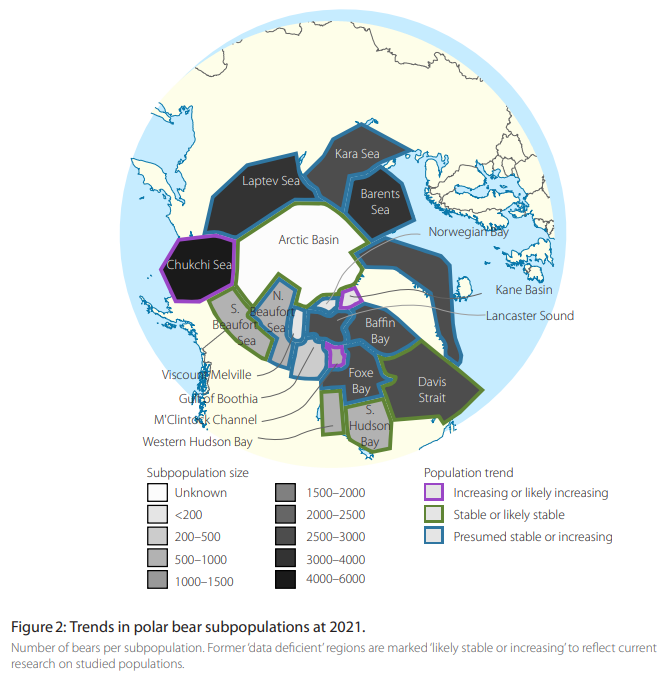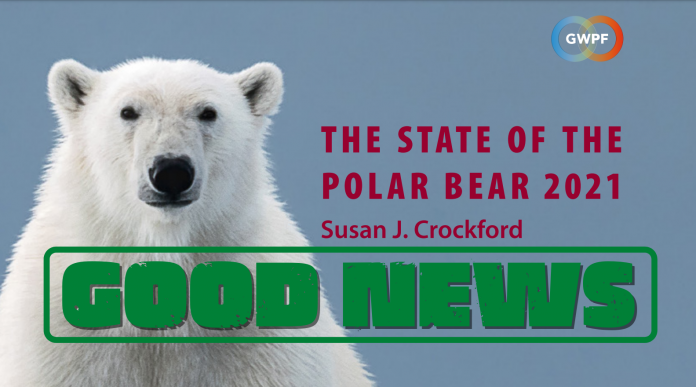A recent article on Climate Change Dispatch, “State Of The Polar Bear 2021: Arctic Bears Continue To Thrive,” covers recent research demonstrating polar bears in general are healthy and their population numbers are likely increasing despite mainstream media narratives claiming otherwise.
In the article, writer Benny Peiser, Ph.D., director of the United Kingdom’s Global Warming Policy Foundation, summarizes the findings of a study conducted by zoologist Susan Crockford, Ph.D. discussing the current state of polar bear populations. Aside from finding polar bears as a species and most subpopulations are doing well and increasing in numbers, she also describes how official government agencies are not using the most up to date data on polar bear populations.
From the article:
In the State of the Polar Bear Report 2021, published by the Global Warming Policy Foundation (GWPF) ahead of International Polar Bear Day tomorrow, zoologist Dr. Susan Crockford explains that while the IUCN Polar Bear Specialist Group (PBSG) promotes the impression that polar bear population numbers are declining, the results of recent studies indicate otherwise.
Crockford further clarifies that the global population estimate used by the PBSG has not been updated since 2015, even though the results of numerous surveys have been published since then.
Crockford’s study found that polar bear population estimates used to maintain their conservation status as “threatened” are based on computer models rather than physical reality—meaning surveys of polar bear populations. Reliable survey data collected from multiple research groups indicate polar bear numbers have increased by 6,000 bears or more across their entire range since 2016.
This is despite climate alarmists warning a sharp decline summer sea ice would polar bears hunting range and access to seals, their primary diet. In fact, Crockford’s research suggests that declining summer ice may be leading to an increase in the populations of polar bears’ preferred prey.
Modest declines in summer sea ice were expected to negatively affect Chukchi Sea ice-dependent seals, but previous research has shown that the opposite occurred: body condition and reproduction in both ringed and bearded seals increased with less summer ice.
Data shows polar bears in some areas are carrying more fat into their months of winter hibernation than in decades prior, and have better rates of cub survival and stable litter sizes. In addition, sea ice extent has begun to increase in recent years.
Climate Realism has reported previously concerning alarmists falsely claiming polar bears are declining or threatened with extinction due to climate change, here, here, and here, for example. The data has been clear that polar bear numbers are increasing across most subpopulations despite reductions in summer sea ice extent. As the graphic provided by Crockford shows, this positive trend has continued.

There is also good news for the humans who share these arctic predators’ natural range; Crockford’s study found fewer polar bear attacks on humans were reported in 2021 than previous years. This finding calls into question the validity of media claims that ‘heat waves’ are causing polar bear attacks. It may be reasonable to assume that more bears would lead to more human encounters, but data shows that polar bears are not suffering from widespread starvation that would result in them coming into contact with humans more often, much less pressure them into actively hunting humans.
By all measures, it appears that polar bear populations are doing just fine, even flourishing, despite the dire warnings about climate change. Once again, real world data discredits alarming modelling predictions.


















Ms. Lueken, Thanks for your objective and reasonable reporting on the real state of “climate change,” and its mostly beneficial effects on the life of the planet. Our respects also to Dr. Robinson for his courage and steadfastness from a long time reader of Access to Energy.